Related Research Articles
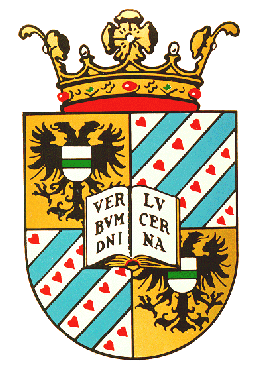
The University of Groningen is a public research university of more than 30,000 students in the city of Groningen in the Netherlands. Founded in 1614, the university is the second oldest in the country and one of the most traditional and prestigious universities in the Netherlands.

Marius Job Cohen is a retired Dutch politician and jurist who served as Mayor of Amsterdam from 2001 to 2010 and Leader of the Labour Party (PvdA) from 2010 to 2012.

Peter Nijkamp is a Dutch economist, Professor of Regional Economics and Economic Geography at the Vrije Universiteit, Amsterdam, the Netherlands, a fellow of the Tinbergen Institute and President of the Governing Board of the Netherlands Research Council (NWO). He is ranked among the top 100 economists in the world according to IDEAS/RePEc, and is by far the most prolific economist. Towards the end of his career at the VU university Nijkamp faced accusations of self-plagiarism and VU-appointed investigators have criticised referencing methods in some of his work.
Femme Simon Gaastra was a Dutch Professor of maritime history at the University of Leiden and a leading expert on the history of the Dutch East India Company.

The Netherlands Institute for Advanced Study in the Humanities and Social Sciences (NIAS) in Amsterdam, Netherlands, is an independent research institute in the field of the humanities and social and behavioural sciences founded in 1970. The institute offers advanced research facility for international scholars of all of the humanities and social sciences. It is a member of Some Institutes for Advanced Study (SIAS) and the Network of European Institutes for Advanced Studies (NetIAS).

Jouke de Vries is a Dutch political scientist, university administrator, and politician. He is chairman of the Executive Board of the University of Groningen (RUG) in the Netherlands. Before that he was Dean of the University of Groningen/Campus Fryslân in Leeuwarden.
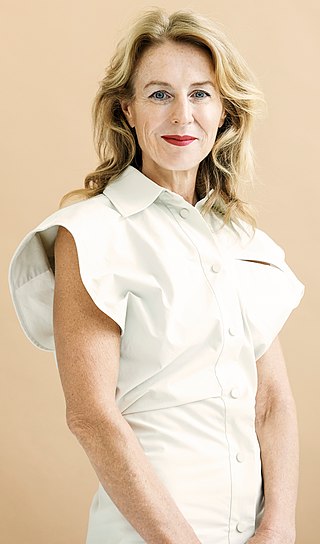
Heleen Mees is a Dutch opinion writer, economist, and lawyer. Involved with politics and public policy in the Netherlands and the US, she has also taught at universities in both countries.
Jacobus Ruurd "Jaap" Bruijn, was a Dutch maritime historian. He was professor of maritime history at the University of Leiden from 1979 until his retirement in 2003. During his 41-year teaching career as The Netherlands' only university professor of maritime history, he guided the doctoral theses of at least 49 graduate students.

Klaas Henderikus Willem Knot is a Dutch economist and central banker who is the current President of the Dutch central bank De Nederlandsche Bank (DNB). In this capacity he serves as a member of the Governing Council of the European Central Bank (ECB), as well as of the Board of Governors of the International Monetary Fund (IMF). Knot also holds a position as Professor in Monetary Stability at the University of Amsterdam and honorary professor at the University of Groningen.

Willem Hendrik Maria (Henk) Zijm is a Dutch mathematician, and Professor Production and Supply Chain Management and Emeritus Rector Magnificus (2005–2009) at the University of Twente.
Petrus Antonius Verheyen was a Dutch economist and academic who was Emeritus Professor of Econometrics at the Tilburg University.
Academic ranks in the Netherlands are the titles, relative importance and power of professors, researchers, and administrative personnel held in academia.
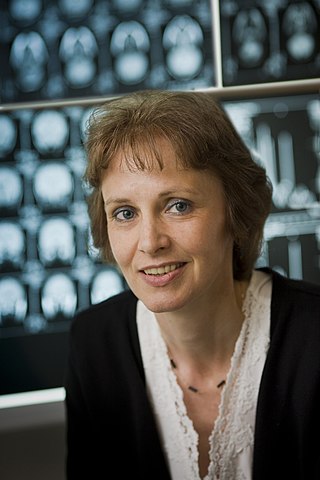
Marjo S. van der Knaap is a Dutch professor of pediatric neurology at VU University Amsterdam and Amsterdam University Medical Centers. She was a winner of the 2008 Spinoza Prize. Her research focuses on white matter disorders.

Willem van der Woude was a Dutch mathematician and rector magnificus (chancellor) of the University of Leiden.

Erik Johan Anton (Erik) Scherder is a Dutch professor of neuropsychology who is connected to the Vrije Universiteit in Amsterdam (VU). Scherder followed his education to physiotherapist in the late seventies after which he worked in the Valeriuskliniek in Amsterdam. Afterwards he followed the study psychology at the Vrije Universiteit of Amsterdam with a specialization in neuropsychology, in which he promoted in 1995.

Isaäc Arend "Iek" Diepenhorst was a Dutch politician of the defunct Anti-Revolutionary Party (ARP) and later the Christian Democratic Appeal (CDA) party and jurist.
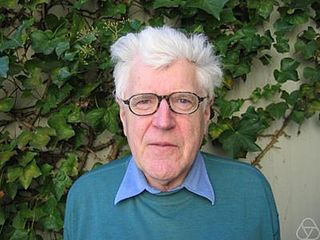
Jacob Pieter "Jaap" Murre was a Dutch mathematician specializing in algebraic geometry. He was a professor of mathematics at Leiden University from 1961 to 1994.
Adriaan Hendrik"Ad"Stouthamer was a Dutch microbiologist. He was a professor at the Vrije Universiteit Amsterdam from the 1960s to 1996. His research was mostly focused on the metabolism of microbiological cultures.
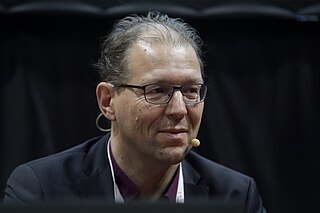
Rens Bod is a professor in digital humanities and history of humanities at the University of Amsterdam. His research focuses on the exploration of patterns and underlying principles in language, music, art, literature and history. He also investigates the history of pattern searching in the humanities from a supranational perspective, thereby giving an impulse to the new field of "history of the humanities". In addition, Bod explores the history of the human search for meaning and purpose, and the underlying patterns and principles therein.
Jonathan Emanuël Soeharno is a Dutch lawyer, professor, and politician. He has been working for law firm De Brauw Blackstone Westbroek since 2008 and as a professor at the University of Amsterdam since 2012. He served as a member of the Senate on behalf of the Christian Democratic Appeal (CDA) for four months between 2021 and 2022 as the replacement of Ben Knapen.
References
- 1 2 3 4 "Prof. mr. J.W. Zwemmer, 1945 -" (in Dutch). University of Amsterdam. Retrieved 1 December 2023.
- 1 2 Schenk, Sylvester (2021). "Emeriti Van der Geld, Jansen, Kogels en Zwemmer over onafhankelijkheid hoogleraren". Het Register (in Dutch). Register Belastingadviseurs (3). Retrieved 1 December 2023.
- ↑ "Jaap Zwemmer". debeeldunie.nl (in Dutch). 19 February 2007. Archived from the original on 3 December 2021.
- ↑ Zwemmer, J.W.; Cornelisse, R.P.C.; Wattèl, P.J. (2006). Dat is verder geen probleem: vriendenbundel Jaap Zwemmer : aan hem aangeboden bij zijn afscheidscollege als hoogleraar belastingrecht aan de Universiteit van Amsterdam, 17 november 2006. Andere wetenschappelijke uitgaven (in Dutch). Sdu Fiscale & Financiële Uitgevers. ISBN 978-90-6476-201-7 . Retrieved 2023-12-01.
- 1 2 Strikkers, Henk (24 February 2022). "Zuidaskantoren oefenden invloed uit op publicaties medewerkers belastingrecht". folia.nl. Archived from the original on 24 March 2023.
- ↑ "Eredoctoraat UvA bekroning voor Mulisch". het Parool (in Dutch). 9 January 2007. Retrieved 1 December 2023.
- ↑ "Van den Boom krijgt rectoraat UvA". AT5.nl (in Dutch). 1 October 2007. Retrieved 1 December 2023.
- ↑ Luynedijk, Wubby (14 February 2013). "Ongelukkig, mager, maar geen reden tot straf" . NRC Handelsblad (in Dutch). Retrieved 1 December 2023.
- ↑ Wolthekker, Dirk (28 February 2012). "'Eedaflegging om bewustwording te bevorderen'". folia.nl (in Dutch). Retrieved 1 December 2023.
- ↑ "Commissie VU start onderzoek werk Nijkamp". Algemeen Dagblad (in Dutch). 17 January 2014. Retrieved 1 December 2023.
- ↑ van Kolfschooten, Frank; aan de Brugh, Marcel (18 March 2015). "Hoogleraar Nijkamp: rapport is 'broddelwerk'" . NRC Handelsblad (in Dutch). Retrieved 1 December 2023.
- ↑ "Een veelgewraakt man" (in Dutch). Fiscaal Tijdscrift FED. 1 January 1995. Retrieved 1 December 2023.
- 1 2 "Thema interview: 'Ik geef mijn mening, maar alternatieven lever ik er niet bij'" (PDF). Orde (in Dutch). June 2013. pp. 18–21. Retrieved 1 December 2023.
- ↑ Mandemaker, Arnold (3 April 2018). "Elkerliek Helmond vindt toezichthouder" (in Dutch). Eindhovens Dagblad. Retrieved 1 December 2023.
- ↑ "Dirk de Kruif voorzitter raad van toezicht". zaandsmedischcentrum.nl (in Dutch). 22 December 2022. Archived from the original on 22 March 2023.
- ↑ "Nieuwe voorzitter Raad van Toezicht Zorgpartners Friesland" (in Dutch). tjongerschans.nl. 14 December 2022. Retrieved 1 December 2023.
- ↑ "Jaap Zwemmer". Royal Netherlands Academy of Arts and Sciences. Archived from the original on 16 May 2022.
- ↑ "De zelfcensuur van hoogleraren met dubbele pet". nextens.nl (in Dutch). 28 June 2021. Archived from the original on 10 June 2023.
- ↑ "Hoogleraar: Teeven medeplichtig aan strafbaar feit" (in Dutch). RTL Nieuws. 10 March 2015. Retrieved 1 December 2023.
- ↑ Duin, Roelf Jan (6 April 2016). "'Elke euro belasting die de een ontwijkt, moet de ander meer betalen'" . het Parool (in Dutch). Retrieved 1 December 2023.
- ↑ "'Ongebruikelijke' belastingcompensatie Oranjes 'moet stoppen'" (in Dutch). Nederlandse Omroep Stichting. 11 October 2016. Archived from the original on 4 July 2022.